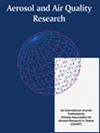Photocatalytic Degradation of Gaseous Acetone by Photocatalysts with Visible Light and their Potential Applications in Painting
IF 2.5
4区 环境科学与生态学
Q3 ENVIRONMENTAL SCIENCES
引用次数: 3
Abstract
Volatile organic compounds (VOCs) are air pollutants associated with health problem. Paints mixed with photocatalytic (PC) materials are considered to be effective in the removal of VOCs. Therefore, this investigation aimed to produce a novel visible induced photocatalyst component in paint. The synthesized photocatalysts (i.e., Ag-TiO 2 and Fe-TiO 2 ) were self-prepared by sol-gel method and further used to produce paints. The effects of the paints on VOC (i.e., acetone) degradation under the irradiation of visible light were tested in a batch PC reactor and an environmental chamber. In order to evaluate the control effect of VOCs using the paint, a simulated test was conducted in a real room. The results of batch experiments showed that the degradation efficiencies of acetone by the paints were lower than that by the related photocatalysts. The paints made of 3% Fe-TiO 2 and 1% Ag-TiO 2 achieved the highest acetone degradation efficiency of 32.7 and 21.3%, respectively. The degradation test conducted in the environmental chamber indicated that the degradation efficiencies of acetone were 24.9, 46.2, and 32.4% for the paints made of TiO 2 , 3% Fe-TiO 2 and 1% Ag-TiO 2 , respectively. It was evidently provided that the paint made of 3% Fe-TiO 2 could effectively degrade organic pollutants in indoor environments.可见光光催化降解气态丙酮及其在涂料中的潜在应用
挥发性有机化合物(VOCs)是与健康问题相关的空气污染物。涂料与光催化(PC)材料混合被认为是有效的去除挥发性有机化合物。因此,本研究旨在制备一种新型的涂料可见光诱导光催化剂。采用溶胶-凝胶法制备了ag - tio2和fe - tio2光催化剂,并将其用于涂料的制备。在间歇式PC反应器和环境箱中测试了涂料在可见光照射下对VOC(即丙酮)降解的影响。为了评价该涂料对VOCs的控制效果,在实际室内进行了模拟试验。批量实验结果表明,涂料对丙酮的降解效率低于相关光催化剂。由3% fe - tio2和1% ag - tio2组成的涂料对丙酮的降解效率最高,分别为32.7%和21.3%。在环境室中进行的降解试验表明,对于由tio2、3% fe - tio2和1% ag - tio2制成的涂料,丙酮的降解效率分别为24.9%、46.2和32.4%。结果表明,含3% fe - tio2的涂料能有效降解室内环境中的有机污染物。
本文章由计算机程序翻译,如有差异,请以英文原文为准。
求助全文
约1分钟内获得全文
求助全文
来源期刊

Aerosol and Air Quality Research
ENVIRONMENTAL SCIENCES-
CiteScore
8.30
自引率
10.00%
发文量
163
审稿时长
3 months
期刊介绍:
The international journal of Aerosol and Air Quality Research (AAQR) covers all aspects of aerosol science and technology, atmospheric science and air quality related issues. It encompasses a multi-disciplinary field, including:
- Aerosol, air quality, atmospheric chemistry and global change;
- Air toxics (hazardous air pollutants (HAPs), persistent organic pollutants (POPs)) - Sources, control, transport and fate, human exposure;
- Nanoparticle and nanotechnology;
- Sources, combustion, thermal decomposition, emission, properties, behavior, formation, transport, deposition, measurement and analysis;
- Effects on the environments;
- Air quality and human health;
- Bioaerosols;
- Indoor air quality;
- Energy and air pollution;
- Pollution control technologies;
- Invention and improvement of sampling instruments and technologies;
- Optical/radiative properties and remote sensing;
- Carbon dioxide emission, capture, storage and utilization; novel methods for the reduction of carbon dioxide emission;
- Other topics related to aerosol and air quality.
 求助内容:
求助内容: 应助结果提醒方式:
应助结果提醒方式:


